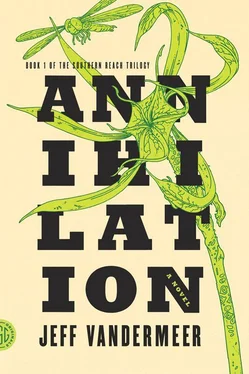That night we talked about the tower, although the other three insisted on calling it a tunnel. The responsibility for the thrust of our investigations resided with each individual, the psychologist’s authority describing a wider circle around these decisions. Part of the current rationale for sending the expeditions lay in giving each member some autonomy to decide, which helped to increase “the possibility of significant variation.”
This vague protocol existed in the context of our separate skill sets. For example, although we had all received basic weapons and survival training, the surveyor had far more medical and firearms experience than the rest of us. The anthropologist had once been an architect; indeed, she had years ago survived a fire in a building she had designed, the only really personal thing I had found out about her. As for the psychologist, we knew the least about her, but I think we all believed she came from some kind of management background.
The discussion of the tower was, in a way, our first opportunity to test the limits of disagreement and of compromise.
“I don’t think we should focus on the tunnel,” the anthropologist said. “We should explore farther first, and we should come back to it with whatever data we gather from our other investigations—including of the lighthouse.”
How predictable, and yet perhaps prescient, for the anthropologist to try to substitute a safer, more comfortable option. Although the idea of mapping seemed perfunctory or repetitive to me, I could not deny the existence of the tower, of which there was no suggestion on any map.
Then the surveyor spoke. “In this case I feel that we should rule out the tunnel as something invasive or threatening. Before we explore farther. It’s like an enemy at our backs otherwise, if we press forward.” She had come to us from the military, and I could see already the value of that experience. I had thought a surveyor would always side with the idea of further exploration, so this opinion carried weight.
“I’m impatient to explore the habitats here,” I said. “But in a sense, given that it is not noted on any map, the ‘tunnel’ … or tower … seems important. It is either a deliberate exclusion from our maps and thus known … and that is a message of sorts … or it is something new that wasn’t here when the last expedition arrived.”
The surveyor gave me a look of thanks for the support, but my position had nothing to do with helping her. Something about the idea of a tower that headed straight down played with a twinned sensation of vertigo and a fascination with structure. I could not tell which part I craved and which I feared, and I kept seeing the inside of nautilus shells and other naturally occurring patterns balanced against a sudden leap off a cliff into the unknown.
The psychologist nodded, appeared to consider these opinions, and asked, “Does anyone yet have even an inkling of a sensation of wanting to leave?” It was a legitimate question, but jarring nonetheless.
All three of us shook our heads.
“What about you?” the surveyor asked the psychologist. “What is your opinion?”
The psychologist grinned, which seemed odd. But she must have known any one of us might have been tasked with observing her own reactions to stimuli. Perhaps the idea that a surveyor, an expert in the surface of things, might have been chosen, rather than a biologist or anthropologist, amused her. “I must admit to feeling a great deal of unease at the moment. But I am unsure whether it is because of the effect of the overall environment or the presence of the tunnel. Personally, I would like to rule out the tunnel.”
Tower.
“Three to one, then,” the anthropologist said, clearly relieved that the decision had been made for her.
The surveyor just shrugged.
Perhaps I’d been wrong about curiosity. The surveyor didn’t seem curious about anything.
“Bored?” I asked.
“Eager to get on with it,” she said, to the group, as if I’d asked the question for all of us.
We were in the communal tent for our talk. It had become dark by then and there came soon after the strange mournful call in the night that we knew must have natural causes but created a little shiver regardless. As if that was the signal to disband, we went back to our own quarters to be alone with our thoughts. I lay awake in my tent for a while trying to turn the tower into a tunnel, or even a shaft, but with no success. Instead, my mind kept returning to a question: What lies hidden at its base?
* * *
During our hike from the border to the base camp near the coast, we had experienced almost nothing out of the ordinary. The birds sang as they should; the deer took flight, their white tails exclamation points against the green and brown of the underbrush; the raccoons, bowlegged, swayed about their business, ignoring us. As a group, we felt almost giddy, I think, to be free after so many confining months of training and preparation. While we were in that corridor, in that transitional space, nothing could touch us. We were neither what we had been nor what we would become once we reached our destination.
The day before we arrived at the camp, this mood was briefly shattered by the appearance of an enormous wild boar some distance ahead of us on the trail. It was so far from us that even with our binoculars we could barely identify it at first. But despite poor eyesight, wild pigs have prodigious powers of smell, and it began charging us from one hundred yards away. Thundering down the trail toward us … yet we still had time to think about what we might do, had drawn our long knives, and in the surveyor’s case her assault rifle. Bullets would probably stop a seven-hundred-pound pig, or perhaps not. We did not feel confident taking our attention from the boar to untie the container of handguns from our gear and open its triple locks.
There was no time for the psychologist to prepare any hypnotic suggestion designed to keep us focused and in control; in fact, all she could offer was “Don’t get close to it! Don’t let it touch you!” while the boar continued to charge. The anthropologist was giggling a bit out of nervousness and the absurdity of experiencing an emergency situation that was taking so long to develop. Only the surveyor had taken direct action: She had dropped to one knee to get a better shot; our orders included the helpful directive to “kill only if you are under threat of being killed.”
I was continuing to watch through the binoculars, and as the boar came closer, its face became stranger and stranger. Its features were somehow contorted, as if the beast was dealing with an extreme of inner torment. Nothing about its muzzle or broad, long face looked at all extraordinary, and yet I had the startling impression of some presence in the way its gaze seemed turned inward and its head willfully pulled to the left as if there were an invisible bridle. A kind of electricity sparked in its eyes that I could not credit as real. I thought instead it must be a by-product of my now slightly shaky hand on the binoculars.
Whatever was consuming the boar also soon consumed its desire to charge. It veered abruptly leftward, with what I can only describe as a great cry of anguish, into the underbrush. By the time we reached that spot, the boar was gone, leaving behind a thoroughly thrashed trail.
For several hours, my thoughts turned inward toward explanations for what I had seen: parasites and other hitchhikers of a neurological nature. I was searching for entirely rational biological theories. Then, after a time, the boar faded into the backdrop like all else that we had passed on our way from the border, and I was staring into the future again.
* * *
The morning after we discovered the tower we rose early, ate our breakfast, and doused our fire. There was a crisp chill to the air common for the season. The surveyor broke open the weapons stash and gave us each a handgun. She herself continued to hold on to the assault rifle; it had the added benefit of a flashlight under the barrel. We had not expected to have to open that particular container so soon, and although none of us protested, I felt a new tension between us. We knew that members of the second expedition to Area X had committed suicide by gunshot and members of the third had shot each other. Not until several subsequent expeditions had suffered zero casualties had our superiors issued firearms again. We were the twelfth expedition.
Читать дальше
Конец ознакомительного отрывка
Купить книгу












